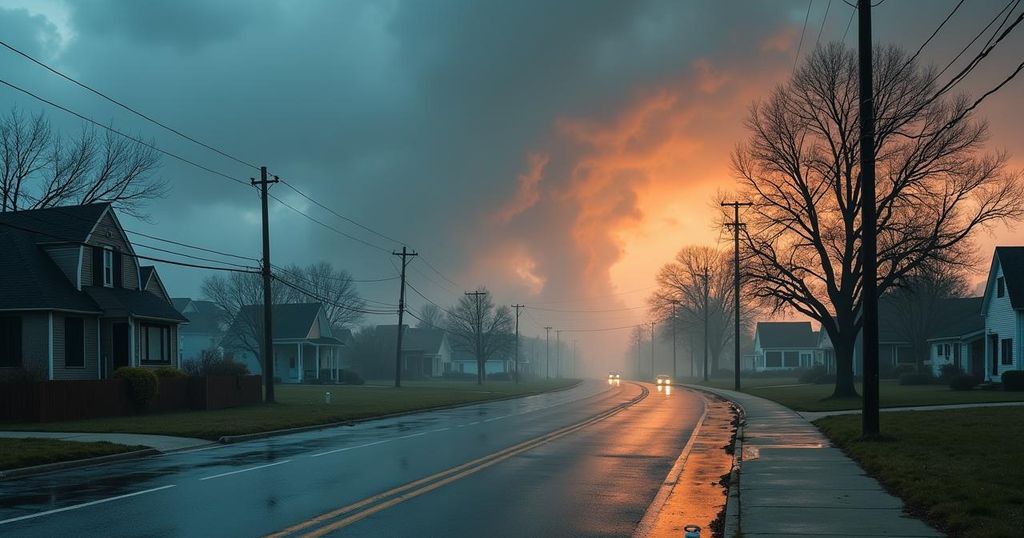Impact of Climate Change on Hurricanes: Helene and Milton
A recent study announced that climate change heightened Hurricane Helene’s rainfall by 10% and wind speeds by 11%. As Hurricane Milton approaches Florida, scientists predict similar intensification. Increased sea temperatures linked to climate change have raised the likelihood of hurricanes like Helene, which caused over 230 deaths and 15 feet storm surges in its path. Continued fossil fuel use will worsen hurricane statistics in the future, prompting a call for improved emergency preparedness and resilience strategies.
A recent study has determined that human-induced climate change has exacerbated the impacts of Hurricane Helene, increasing its rainfall by approximately ten percent and enhancing wind speeds by eleven percent. The findings were released just as Hurricane Milton strengthens and approaches the Florida coast. According to data from the World Weather Attribution group, the average sea temperature in the Gulf of Mexico was 3.6 degrees Fahrenheit (2 degrees Celsius) above normal, increasing the likelihood of storms like Helene by 200 to 500 times. Ben Clarke, a climate researcher at Imperial College London, emphasized the correlation between warmer air, increased moisture capacity, and the heightened intensity of rainfall associated with Helene, which would have led to notable precipitation even in the absence of climate change. The study authors forecast similar intensification for Hurricane Milton. The repercussions of such storms extend beyond coastal areas, with inland flooding posing significant risks, as was seen in the wake of Helene, where many fatalities were attributed to severe inland flooding rather than high winds. Helene’s catastrophic impact included a record storm surge of 15 feet (4.57 meters) and sustained winds reaching 140 miles per hour (225.31 kilometers per hour), resulting in over 230 deaths and extensive damage across multiple states. Helene dumped over 40 trillion gallons of rain, with scientists asserting that this quantity was significantly inflated due to climate change influences. Effects of climate change on hurricanes such as Helene have led to an increased likelihood, with storms of this magnitude now occurring approximately every 52 years, according to calculations. The WWA, established in 2015, employs rapid climate attribution studies to evaluate the role of climate change in extreme weather events. While these studies are not peer-reviewed, they utilize peer-reviewed methodologies to assess the consequences of global warming evidenced in events like Helene. Furthermore, an analysis by the Department of Energy’s Lawrence Berkeley National Lab determined that climate change was responsible for 50% more rainfall in specific areas impacted by Helene, making such extreme rainfall events up to twenty times more likely in these regions. Kim Cobb, director at the Institute at Brown for Environment and Society, acknowledged uncertainties regarding the exact impact of climate change on storm intensity but affirmed its role in increasing the devastation caused by such phenomena. Cobb stressed that Helene and Milton should act as a catalyst for enhanced emergency preparedness and resilience strategies, urging a reduction in fossil fuel dependency. As warmer conditions persist, the likelihood of more severe hurricanes is set to escalate. The concurrence of two such storms highlights the significance of human actions in shaping future weather patterns. Ben Clarke reiterated the necessity for humankind to seize control of future climate trajectories through the transformation of energy systems and a reduction in fossil fuel consumption.
The background of this study centers on the connection between climate change and the increasingly severe nature of hurricanes impacting coastal and inland areas. As global temperatures rise due to human activities, the effects are observable in weather patterns, leading to intensified storm systems. This phenomenon is particularly concerning for vulnerable regions in coastal states, where extreme weather events have historically caused substantial destruction and loss of life. The scientific community continues to explore the implications of climate change on severe weather events, focusing on attributing specific incidents to human-caused climate impacts.
In conclusion, the findings illuminate the profound effects of climate change on hurricane intensification, underscoring a marked increase in rainfall and wind intensity attributed to human activities. Storms like Helene and Milton exemplify the potential for future disasters stemming from ongoing climate developments. Urgent action is imperative to mitigate the risks associated with such extreme weather events, particularly through reduced fossil fuel dependence and enhanced disaster preparedness.
Original Source: www.detroitnews.com




Post Comment